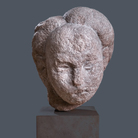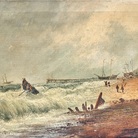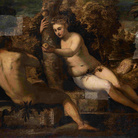Gli Italiani di Crimea. Il genocidio dimenticato

Gli Italiani di Crimea. Il genocidio dimenticato, Biblioteca civica Centrale, Torino
Dal 1 December 2014 al 10 December 2014
Torino
Luogo: Biblioteca civica Centrale
Indirizzo: via della Cittadella 5
Orari: lunedì 15-19.55; da martedì a venerdì 8.15-19.55; sabato 10.30-18
Costo del biglietto: ingresso gratuito
Telefono per informazioni: +39 011 4429836 / 63
E-Mail info: attivitaculturali_biblioteche@comune.torino.it
Sito ufficiale: http://www.comune.torino.it
Partita con grande successo di pubblico dall’Università Ca’ Foscari di Venezia, lo scorso gennaio, la mostra fotografica "Gli Italiani di Crimea. Il genocidio dimenticato" fa ora tappa a Torino, presso la Biblioteca civica Centrale. Una narrazione intensa attraverso le immagini, della drammatica storia degli italiani di Crimea, una piccola comunità decimata dalla deportazione di massa nei Gulag del Kazakhstan, nel 1942.
Giunti sulle rive del Mar Nero nel corso dell’Ottocento gli italiani, quasi tutti pugliesi e in gran parte concentrati nella cittadina di Ker?, si inserirono perfettamente nel tessuto locale e anzi, in pochi decenni, diedero vita alla comunità straniera più fiorente e rispettata, capace di affermarsi in tutti i settori della vita economica, dal commercio all’agricoltura, dalle attività legate alla pesca all’artigianato, dalla piccola imprenditoria alle libere professioni. Con la Rivoluzione d’Ottobre e la collettivizzazione, tutti i loro beni furono requisiti. Poi, negli Anni Trenta, arrivarono le carestie e quindi, nel ’37-’38, il Grande Terrore delle purghe staliniane, coi processi sommari e le condanne a morte o ai lavori forzati. Alcune famiglie riuscirono a espatriare e a raggiungere Trieste.
Per chi rimase, invece, il 29 gennaio 1942 fu la catastrofe: per il solo fatto di essere italiani, i circa 2.000 connazionali di Ker? furono rastrellati casa per casa e deportati in massa nei Gulag, come ritorsione contro l’invasione dell’Unione Sovietica da parte dell’Armir. Una pulizia etnica in piena regola, ignorata dai libri di storia. In pochi anni la comunità italiana di Crimea fu quasi totalmente spazzata via dal freddo, dalla fame, dalle malattie, dalle fucilazioni, dalle condizioni carcerarie disumane e dai lavori forzati. Nel dopoguerra il silenzioso ritorno a Ker? di un centinaio di sopravvissuti, che dovettero ricominciare da zero: senza casa, senza soldi, senza lavoro, con la paura di parlare italiano e additati come traditori.
Una storia di dolore ma anche di grande dignità e di speranza, un legame intenso e un amore profondo per l’Italia mai venuto meno, come dimostra l’attaccamento dei superstiti alla lingua e alle tradizioni degli antenati.
I proventi del catalogo saranno devoluti, a scopo benefico, all’Associazione C.E.R.K.I.O
Giunti sulle rive del Mar Nero nel corso dell’Ottocento gli italiani, quasi tutti pugliesi e in gran parte concentrati nella cittadina di Ker?, si inserirono perfettamente nel tessuto locale e anzi, in pochi decenni, diedero vita alla comunità straniera più fiorente e rispettata, capace di affermarsi in tutti i settori della vita economica, dal commercio all’agricoltura, dalle attività legate alla pesca all’artigianato, dalla piccola imprenditoria alle libere professioni. Con la Rivoluzione d’Ottobre e la collettivizzazione, tutti i loro beni furono requisiti. Poi, negli Anni Trenta, arrivarono le carestie e quindi, nel ’37-’38, il Grande Terrore delle purghe staliniane, coi processi sommari e le condanne a morte o ai lavori forzati. Alcune famiglie riuscirono a espatriare e a raggiungere Trieste.
Per chi rimase, invece, il 29 gennaio 1942 fu la catastrofe: per il solo fatto di essere italiani, i circa 2.000 connazionali di Ker? furono rastrellati casa per casa e deportati in massa nei Gulag, come ritorsione contro l’invasione dell’Unione Sovietica da parte dell’Armir. Una pulizia etnica in piena regola, ignorata dai libri di storia. In pochi anni la comunità italiana di Crimea fu quasi totalmente spazzata via dal freddo, dalla fame, dalle malattie, dalle fucilazioni, dalle condizioni carcerarie disumane e dai lavori forzati. Nel dopoguerra il silenzioso ritorno a Ker? di un centinaio di sopravvissuti, che dovettero ricominciare da zero: senza casa, senza soldi, senza lavoro, con la paura di parlare italiano e additati come traditori.
Una storia di dolore ma anche di grande dignità e di speranza, un legame intenso e un amore profondo per l’Italia mai venuto meno, come dimostra l’attaccamento dei superstiti alla lingua e alle tradizioni degli antenati.
I proventi del catalogo saranno devoluti, a scopo benefico, all’Associazione C.E.R.K.I.O
SCARICA IL COMUNICATO IN PDF
COMMENTI

-
 Dal 20 February 2026 al 19 July 2026
Roma | Mercati di Traiano Museo dei Fori Imperiali
Dal 20 February 2026 al 19 July 2026
Roma | Mercati di Traiano Museo dei Fori Imperiali
Constantin Brâncuși. Le origini dell’Infinito
-
 Dal 18 February 2026 al 19 July 2026
Padova | Centro Culturale Altinate | San Gaetano
Dal 18 February 2026 al 19 July 2026
Padova | Centro Culturale Altinate | San Gaetano
M.C. ESCHER. Tutti i capolavori
-
 Dal 14 February 2026 al 31 May 2026
Parma | Palazzo Tarasconi
Dal 14 February 2026 al 31 May 2026
Parma | Palazzo Tarasconi
Impressionisti: 100 anni di riflessi. Gli Impressionisti da Monet a Bonnard
-
 Dal 14 February 2026 al 16 April 2026
Ancona | Pinacoteca Civica Francesco Podesti
Dal 14 February 2026 al 16 April 2026
Ancona | Pinacoteca Civica Francesco Podesti
TIZIANO VECELLIO E LORENZO LOTTO. Due capolavori del Rinascimento alla Pinacoteca Civica di Ancona per due mostre studio
-
 Dal 12 February 2026 al 14 June 2026
Roma | Galleria Nazionale d’Arte Antica in Palazzo Barberini
Dal 12 February 2026 al 14 June 2026
Roma | Galleria Nazionale d’Arte Antica in Palazzo Barberini
BERNINI E I BARBERINI
-
 Dal 11 February 2026 al 7 June 2026
Venezia | Gallerie dell’Accademia
Dal 11 February 2026 al 7 June 2026
Venezia | Gallerie dell’Accademia
Tintoretto racconta la genesi. Ricerca, analisi e restauro


